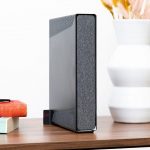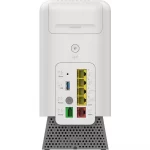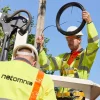Vodafone UK Quietly Launch New Pro 3 Broadband Plan and WiFi 7 Router UPDATE

Internet, mobile and phone provider Vodafone UK appears to have quietly introduced a new range of fixed line “Pro 3 Broadband” packages, which feature their “all new” Ultra Hub 7 Fibre router and Super WiFi 7 Booster. The headline change here is reflected in the fact that this kit supports the latest Wi-Fi 7 networking standard for faster speeds.
Just to recap. Last year saw Vodafone introduced a new range of Wi-Fi 6 / 6E capable routers and extenders – the ‘Power Hub‘ router and ‘Super Wi-Fi 6 Booster‘ (here), which both harness Wi-Fi 6 technology. The Power Hub router is today the default device they offer, but until now you could also pay a bit more to get their Pro II packages that included their Wi-Fi 6E capable UltraHub (here).
The provider’s Pro packages also typically include additional features, such as a Super WiFi Booster for the “fastest WiFi in every room“, dedicated WiFi Xperts for daily support (i.e. proactively monitor and fix WiFi issues), automatic 4G back-up (dongle/modem) if your fixed broadband service goes down and Secure Net Home for “hassle-free [internet] security and family controls“.
Advertisement
However, back in October 2024 ISPreview spotted that Vodafone were preparing to launch a new range of Wi-Fi 7 capable routers and wireless mesh extenders for their fixed line customers in 2025 (here), which included the Ultra Hub 7 Fibre (FG4278VF), Super Wi-Fi 7 (RP761BVDF) and Ultra HUB7 (DG4278VF). The good news is that these have now quietly started to turn up under their new Pro 3 packages.
The new Wi-Fi 7 kit and other Pro 3 extras will typically set new customers back an extra £9 to £13.50 per month on top of the standard package pricing, which oddly seems to vary between their packages. For example, if you take out their CityFibre powered 82Mbps service, it normally starts at £23.50 per month or £36.50 to get Pro 3 (+£13). By comparison, if you take their 910Mbps package the price starts at £29 or £38 with Pro 3 (+£9).
At the time of writing, Vodafone has yet to put out an official press release, and we don’t have any spec sheets for the new devices. But after a bit of digging, we did uncover that the new Ultra Hub 7 router features 2 x 2.5G LAN ports (one is both WAN and LAN), as well as 2 x Gigabit LAN ports (speed unclear), 2 x telephone ports and 1 x USB port (intended for their 4G backup). Not to mention the usual lights and buttons (power, wps etc.).
The device also features a separate WiFi button, although we’re not sure if this is purely an on-off feature or something else. Vodafone said their Ultra Hub 7 Fibre router will be supported with security updates until 1st August 2032. We hope to have some official information after the weekend.
Advertisement
UPDATE 12th May 2025 @ 12:21pm
Despite now being available, Vodafone has today declined to provide ISPreview with more details until their official announcement, which we’re told will surface in the “coming weeks“. But in the meantime, one of our readers has unearthed an official document that reveals more about the UltraHub 7’s performance and specs (here).
However, we’re taking the new doc with a pinch of salt, not least because it indicates that the new Hub only supports dual-band Wi-Fi (i.e. there’s no mention of 6GHz) and that would be a downgrade from their tri-band UltraHub Wi-Fi 6E. Otherwise, the specs are as follows:
UltraHub 7 Specs
Dual Band Wi-Fi 7 (2.4 + 5 GHz bands)
Antennas 4×4, 4×4
2 GB RAM
4 GB Flash
1 x LAN (GE) – 2.5Gbps
1 x LAN/WAN (GE) -2.5Gbps
2 x LAN – 1 Gbps
1 x Fibre Optic Port
1 x FXS Port
1 x TAE&FXS Combo Ports
1 x WPS button
1 x Wi-Fi buttonMaxspeed Fibre: 2.5Gbps
Max Speed Phy Rate om Wi-Fi: 7.2Gbps
Max Speed single device 2×2: 2Gbps
Access Technology: ZigBee + Thread radio + BLE radioChipset: “Top performance SoC”, but later says Broadcom BCM6726
Mark is a professional technology writer, IT consultant and computer engineer from Dorset (England), he also founded ISPreview in 1999 and enjoys analysing the latest telecoms and broadband developments. Find me on X (Twitter), Mastodon, Facebook, BlueSky, Threads.net and Linkedin.
« GoFibre Grows UK FTTP Broadband Customers in Montrose to 1,000





















































This is just my opinion and also a probable hot take, but for me, ISPs should really be spending money and time improving customer service [even more so in Vodafone’s case, which is well known to be some of the worst in the country], and reliability of their network services.
Gimmicks like Wi-Fi 7 routers using jargon the majority of the general public won’t care about are not of interest to most customers, who couldn’t care less if their network doesn’t give them 3Gbps download speeds over wifi, they just want “an internet connection with meaningful customer support of their provider”.
The techie’s [including myself] that frequent news sites like this will be fine with these things, but its irrelevant if the network is unreliable or there is no customer service.
I agree.
The thing is, some people well a lot of people will see Wi-Fi 7 and think, it has to be better than what I have and will go for the broadband provider because of it.
then they realise it makes no difference whatsoever, because their Wi-Fi devices are Wi-Fi 5 or even below.
I say this to everyone, if your devices have an Ethernet port on, and you can run the cables easily enough to these devices, then use Ethernet.
Wi-Fi is awful, no getting away from that, worse in the u.K since most people have older properties with solid internal walls.
I am lucky in thaqt Wi-fi is pretty all around the house, but i know of people with larger houses and have all sorts of problems with Wi-Fi, sure you can get extenders and Mesh systems, but still not ideal.
I tend to have as much as I can on Ethernet, including my printers.
ISp’s, should concentrate on better customer service and get people who know what they are talking about and not just read from a script and also, get the CS back into the U.K
I wouldn’t want the Vodafone WiFi 7 router if their WiFi 6 router is anything to go by. Absolute rubbish, if you want to tweak the settings. You cannot split the bands.
as the old saying goes, “just because you can, doesn’t mean you should”. Vodafone might have decided that you both can’t and shouldn’t, and for good reason.
A single SSID enables well-behaved devices to make better decisions as to which band they should use, and avoids duplicate IP assignments on devices that use private MAC addresses (since the two SSIDs would appear to the device as entirely separate networks).
The better approach is to provide a separate 2.4GHz only SSID for any poorly designed e-waste that you might have in use. BT/EE appears to allow this with the “compatibility mode” SSID. I don’t know what Vodafone offer.
@Ivor, if what you are saying is true, then why don’t I have that problem? I have four different SSIDs, one for 2.4Ghz only, and yet no problem at all.
Maybe it is because some of these routers produced for ISPs are rubbish, produced to a price that is as low as possible. My router was not that expensive to be honest.
The latest version of their Home Broadband App allows you to split bands via the network assistance/smart home device feature. Meaning you can create a 2.GHz only SSID then merge SSIDs when you need to
they’ve clearly got their priorities in the wrong place.
It’s vodafone, not sure what we are expecting.
https://binaries.vodafone.co.uk/gbnnsauqav4t/4WBG9l7r7orNH9zvoPHmNp/b3784e1846c6efcb8e5301108721ef9c/Vodafone_Pro_3_Broadband_substantiation.pdf
So looking at the Vodafone document am I reading it correctly that the previous Pro Hub could offer higher speeds and that the new hub does not have 6ghz seems like only improvement is the addition of WiFi 7 for the small amount of new device that can use this .
As a matter of interest how does this new hub technically compare to EE WiFi 7 Hub ?
Vs the EE Smart Hub Pro, it would be poor as the EE one has 2.4Ghz, 5Ghz amd 6Ghz 4×4 MIMO and all ports are 2.5Gbit.
If this is anything like their WiFi 6E router – stay away. I had it for a bit and had colossal problems from day 1. Crazy high latency for all wireless devices. It was impossible to troubleshoot because you can’t change any settings like WiFi channel etc as it’s all ‘managed in the cloud’ and their system decides what channel etc you will use for you.
Several complaints later I actually left Vodafone entirely over it.
No 6GHZ band ?
That one makes no sense. I suspect somebody writing the Vodafone docs made a mistake, as Wi-Fi 7 by default supports 6GHz.
Thank you for your reply. I have checked their docs and nothing mentioned about 6ghz
You can technically ship Wi-Fi 7 without using the 6GHz band, it’s just an odd thing for them to do, as that’s usually one of the selling points.
As an employee who recently did the Pro 3 training, I can confirm it’s dual band. One of the questions as part of the training completion specifically asked the differences and listed the new router as dual band. I queried this as I know the Ultra Hub has tri-band and 6ghz but to my amazement they confirmed it was dual band only.
What a crazy crazy thing to do considering wifi 6E was the backbone of the boosters and largely resolved most of the connection issues there.
Thanks for your information “ Employee “
I better upgrade to ultra hub which have tri-band. How good ultra hub 6E with their booster ?
I’ve had this for a week on Cityfibre and absolute poo.
It keeps losing Internet to some of my devices both WiFi and RJ45, no amount of restarts gets them back, stick the old hub on and every device works fine.
Don’t know if it’s due to 2.5GB WAN, W7 connected ONT data light is amber and old hub all green.
Time to cancel and back to old hub, bigger isn’t better.
Yup i have the new ultra hub and 7 booster and yes it is just dual band. But if a downgrade from 6E hub, however still get decent speeds on wifi6 over 5ghz(often full 1gbps)